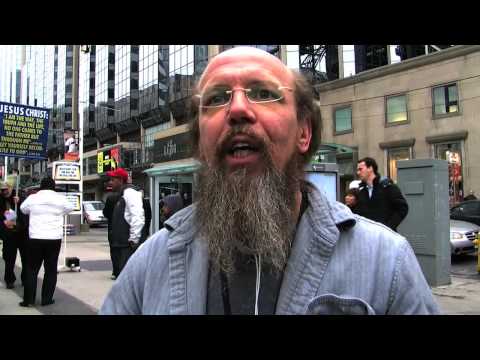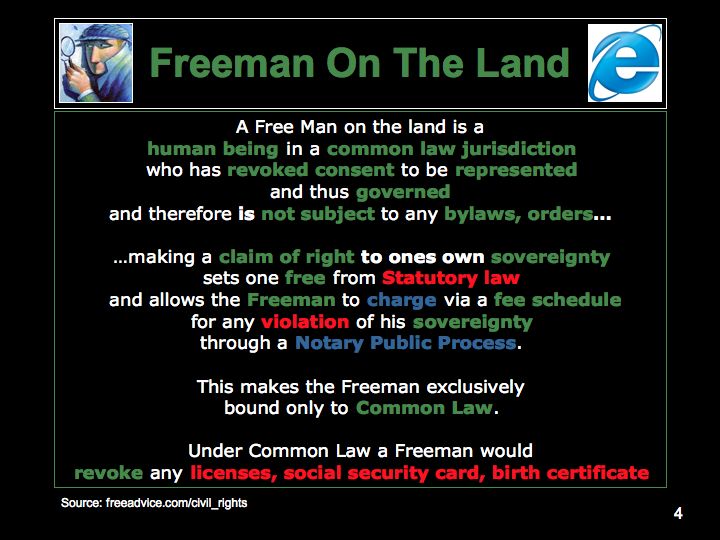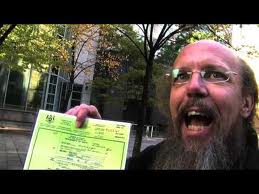The freeman position is not entirely lacking in moral force:
considering government-created law to be a damnable imposition is a defensible stance with a long and respectable history. But their theory of the world is utterly spurious, and their practical approach is made entirely of magic beans and crack.
A lot of freeman ideas revolve around bizarre interpretations of
entries in Black's Law Dictionary — a favourite reference for freemen —
and inventing or seeing
distinctions where there are none to support their beliefs (such as
common versus statute law, "policeman" versus "police officer,"
"understand" versus "stand under," words in CAPITALS having a different
legal meaning to those in lower-case, etc.). A lot of pareidolia with words and concepts is used to derive and justify ideas in freeman theory.
Freemen are typically members of the green ink brigade and often indulge in various other conspiracy theories,
as well as holding strong anti-government and anti-corporate
sentiments. Freemen often try to escape tax and debt repayment by
arguing that they are not required to pay tax, or even to argue that
borrowed money was theirs to start with. Freeman ideas are so far-out that even arch-crackpot Alex Jones thinks they're "quackery," and agrees that using them will probably get you sent to prison.

Freeman methods fail to understand that the law derives its
authority from the fact that the state has the means and the will to use
force to impose it. You can argue that the authorities have no
jurisdiction over you, and you can choose not to recognise their
authority, but as long as the authorities have force to back up their
rules they can enforce sanctions against you. Freemen would argue that
this would be unlawful imprisonment — but at the end of the day you'd
still be in jail.
Common law
Freemen have an obsession with common law, which normally refers to what is known as case law:
| “
|
As distinguished from
statutory law created by the enactment of legislatures, the common law
comprises the body of those principles and rules of action, relating to
the government and security [rights] of persons and property, which
derive their authority solely from usages and customs of immemorial
antiquity, or from the judgements and decrees of the courts recognizing,
affirming, and enforcing such usages and customs; and in this sense,
particularly the ancient unwritten law of England.
|
”
|
|
|
They use this entry to justify a different definition, one which is heavily reliant on the concept of natural law They see common law as applicable to everyone or, as they put it, "applicable to men and women, flesh and blood human beings,"
but statutory law as dependent on choice, an offer of contract, only
applicable to their "person" (their "legal person") and not enforceable
except by consent.
Freeman definitions of common law include "you do not cause harm
or loss to another, while you never breach the peace, and never employ
any mischief in your promises & agreements" (Veronica: of the
chapman family)
and "There are only three ways to break the law: harm another human
being, damage someone else's property, use fraud or mischief in your
contracts" (Robert Menard).
Legal person or strawman
See the main article on this topic: Strawman theory Freemen believe that an individual has two personas. One of them is a
physical, tangible human being, and the other is their legal person, personality or strawman: a legal fiction created when a birth certificate is filed with what would normally be considered someone's name (e.g., JOHN SMITH), capitalization being a particular obsession. They believe their birth certificate is
their legal person, and will attempt to present it in court when said
person is called for, rather than identifying themselves as that person.
Freemen believe that all legal actions, restrictions and statutes
can only be applied to their legal personality, and that, by separating
themselves from their legal person, they can free themselves of having
to abide by statute laws they don't like (or acts, as they would insist
they are not laws). They typically use a slightly different spelling of their name, usually
"John of the family Smith" (variations include "John of Smith" or even
"John: Smith"), entering into what is referred to as Lawful Rebellion, or by filing a Notice of Understanding and Intent and Claim of Right.
They also believe that use of titles such as Mr/Mrs refer to their
legal fiction as opposed to themselves, and will therefore refuse to be
identified using them, in case this creates "joinder" (see below).
Because of their obsession with admiralty law and all things
maritime, freemen believe that their legal person is required to operate
in commerce. It is therefore defined as a vessel or ship in the legal
realm, floating on the sea of commerce.
Notice of understanding and intent and claim of right
A notice of understanding and intent and claim of right is a made-up pseudolegal
document freemen use in an attempt to declare sovereignty. They will
sign such a document, sometimes with a notary, and then send it to the
Queen and sometimes various other figures such as the Prime Minister and
police chiefs.

It usually consists of a series of lines beginning "Whereas it is
my understanding" followed by an assertion which is untrue or
completely illogical. Various parts will state their bizarre
interpretation of the law and their understanding that they do not
consent to it. They are typically much like this example:
| “
|
I, Veronica: of the
Chapman family, hereinafter known as Veronica: Chapman, a flesh and
blood human being in possession of a sovereign and individual spirit, a
living soul, do hereby make Oath and state the following is My Truth and
My Law:
Whereas it is my understanding that in terms of earthly existence
there is no species more supreme than a living, breathing, imaginative
human being blessed with a living soul, and
...
Whereas it is my understanding a living soul who chooses by free
will not to be a member of any society can be referred to as a
Freeman-on-the-land, and
Whereas it is my understanding a Freeman-on-the-land remains entirely and solely under Common Law jurisdiction, and
Whereas I Veronica: Chapman am a Freeman-on-the-land, and ...
|
”
|
Fee schedule
The notice of understanding is typically followed by a "fee schedule"
or "penalty schedules," listing a series of acts and associated
penalties the freeman will attempt to levy against the government for
perceived transgressions. If the state arrests or incarcerates a freeman
against their will, they will then attempt to charge the state a fee
for this action. This does not work out in practice and has attracted
penalties in return.
Lawful rebellion and the Magna Carta

Start of Clause 61 of the Magna Carta of 1215. "Cum autem pro Deo, et ad emendacionem regni nostri, et ad melius sopiendum discordiam inter nos et barones nostros ortam ..."
Lawful rebellion in British freeman theory holds that one can
lawfully choose to cease abiding by the laws, rules and statutes of a
country by simply opting out of society. Lawful rebellion is often used
as an alternative to the Notice of Understanding and Intent and Claim of Right
method, although they are sometimes used together. This claim
supposedly stems from clause 61 of the Magna Carta. It fails when used
in court.
Clause 61 is an historically and constitutionally significant
clause. It gave twenty-five barons the right to meet and overrule the
will of the king and seize his assets, essentially usurping his
authority, should this be considered necessary. This was based on distraint
(the seizure of someone’s property in order to obtain payment of rent
or other money owed), but it was the first time it had been applied to a
monarch. It was one of the first times that there had been any kind of
restriction on a king's power from below, and arguably it was one of the
first checks and balances on the monarch and furthermore the first step
toward a constitutional government. Nevertheless, clause 61 was only in
effect for three months, as King John later renounced it and Pope
Innocent III released King John from his oath to obey it. This led to
the First Barons' War between the king and his barons.
Freemen claim that clause 61 allows them to cease obeying the
state. This sometimes involves sending an affidavit direct to the Queen
declaring one's intent to become a freeman and removing their consent to
be governed. Some freemen believe that the Queen represents the highest
authority in the land as the sovereign, but that she derives her
authority from the people. This then makes them sovereign, such that
there is no higher authority than themselves.
The actual text of Magna Carta's clause 61 explicitly refers to
the King and the Barons (25 of them being required to invoke the clause)
— nowhere is there any mention of the people, free or otherwise; nor
would there be, given the feudal system in place at the time. The phrase
"Lawful Rebellion" appears nowhere in clause 61, being an invention of
freeman mythology.
Freemen claim that the Magna Carta cannot be repealed, but this
simply is not true. It was, in fact replaced by the Magna Carta of 1297,
passed by Edward I in return for new taxes. It is this 1297 version
(without any clause 61 or anything resembling it) which is now "in
force", although by 1969, all but sections 1 (freedom of the church), 9
(freedom of the city of London) and 29 (right to due process) had been
repealed or superseded.

Contracts and statutes
Because of their conception of common law as the only true law,
freemen believe that any laws made by the government are not "laws," but
are instead invitations to contract, or "acts," giving rise to the
freeman maxim, "Acts nor laws." They do not believe that statute law
applies without an individual's consent, and that we are merely
conditioned and deceived by the authorities to believe that they do.
Freemen claim that statutes can have the force of law as a binding
contract under the correct conditions.
Freemen believe that the government has to establish what they refer to as joinder
to link yourself and your legal person. When they ask you whether you
are "John Smith" and you confirm that you are, then you are establishing
joinder. You have then connected your physical and human persons. (In real law, joinder means joining related cases together, not establishing identity.)
The next step is to obtain consent. Statutes are seen as
invitations to enter a contract, which are only legally enforceable if
one enters into the contract consensually. If one does not enter into a
contract, statute laws are not applicable. Freemen believe that the
government is therefore constantly trying to trick people into entering
into a contract with them. They often return bills, notices, summons
and so on with the message "No contract—return to sender".







Kommentáld!